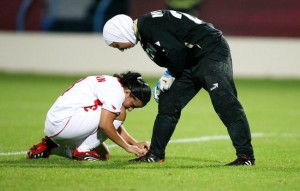Strained Relations Between France and FIFA Over Headscarf Issue in Women’s Football
Tensions have risen between France and FIFA following the ongoing dispute over the wearing of the veil in women’s football. The French Ministry of Sports has pushed back against FIFA President Sepp Blatter’s recent comments, reaffirming the country’s stance on secularism in sport.
Blatter, appearing on BeInSports last weekend, reiterated FIFA’s decision to allow headscarves in women’s football, warning the French Football Federation (FFF) that it must comply with the global body’s ruling. However, Thierry Braillard, the newly appointed Secretary of State for Sport in France, has made it clear that the French government will not be dictated to by FIFA on this matter.
In a statement on RTL, Braillard voiced strong support for the FFF’s position, stating, “The position taken by the French Football Federation and President Noël Le Graët has our full support.” He emphasized that France’s commitment to the principles of secularism—an integral part of the country’s constitution—must be respected in all areas, including sport.
“We are defending the values of the Republic,” Braillard continued. “It is the Republic that we are defending by supporting the French Football Federation’s position. The commitment to secularism is a pillar of our constitution, and it is only natural that the government aligns with the stance of the FFF.”
This disagreement highlights the ongoing tension between French republican values, particularly the principle of secularism, and FIFA’s more lenient approach to the issue of religious symbols in football. While FIFA has allowed the wearing of headscarves on the field, the French government maintains that secularism should prevail, and it is unlikely to back down on its stance.
The situation remains delicate, as FIFA could potentially sanction the FFF for its refusal to comply with the headscarf ruling. The outcome of this dispute could have significant implications for the future of women’s football in France and the broader relationship between the French government and international sporting bodies.












